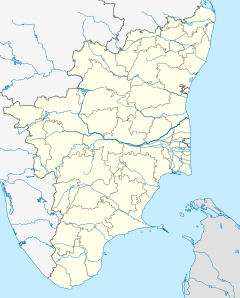Mahishasuramardini mandapa
| Mahishasuramardini Mandapa Mahishasuramardini Cave Temple |
|
|---|---|

Mahishamardini Rock Cut Mandapam
|
|
| Geography | |
| Coordinates | 12°37′00″N 80°11′30″E / 12.6167°N 80.1917°ECoordinates: 12°37′00″N 80°11′30″E / 12.6167°N 80.1917°E |
| Country | India |
| State | Tamil Nadu |
| District | Kancheepuram district |
| Culture | |
| Primary deity | Goddess Durga |
| Architecture | |
| Number of temples | 1 |
| Inscriptions | Inscribed in 1984 under Asia-Pacific of UNESCO |
| History and governance | |
| Date built | Mid-7th century |
| Creator | Pallava dynasty |
Mahishasuramardhini Mandapa (Cave Temple; also known as Yampuri) is an example of Indian rock-cut architecture dating from the late 7th century, of the Pallava dynasty. It is a rock-cut cave temple located on a hill, near a lighthouse, along with other caves in Mamallapuram. It is the one of the finest testimonials of ancient Vishwakarma Sthapathis (Vishwakarma sculpture). Mamallapuram, also popularly known as Mahabalipuram, is a small village to the south of Chennai, in the state of Tamil Nadu, India. The temple is part of the Group of Monuments at Mahabalipuram, a UNESCO World Heritage Site inscribed in 1984. This Cave Temple has many interesting architectural features of which three exquisitely carved reliefs on the cave walls of three sanctums are prominent. One is of Vishnu reclining on the seven hooded serpent, Adisesha, another of Durga, the main deity of the cave temple slaying the buffalo headed demon Mahishasura, and the third sanctum also has a sculpture of Vishnu. The cave also depicts many scenes from the Puranas (Hindu mythology stories in Sanskrit dating from the 5th century AD).
According to legend, Durga killed the demon Mahishasura, who was considered unconquerable. Hence, following his slaying, she was given the title Mahishasuramardhini (conqueror of Mahisha). The granite-carved cave temple depicts the goddess Mahishasuramardhini, considered an incarnation of the goddess Durga, and is named after her as "Mahishasuramardhini Cave Temple". The cave's interior relief depicts this battle. The goddess is shown riding a lion, her several arms holding a bow and arrow, pursuing the retreating Mahisha with his followers.
...
Wikipedia

